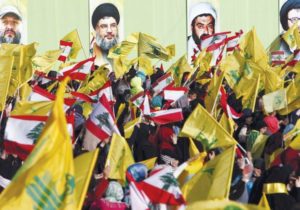
A video surfaced this week which purports to show Lebanese Hezbollah fighters present on the outskirts of the Iraqi city of Mosul. The footage, published by Pan-Arab news site Al-Araby Al-Jaeed, was reportedly filmed in al-Zarka, approximately 30 miles southwest of Mosul, where thousands of Shiite militia fighters have assembled. Though the fighters, seen in the video training Iraqi Shiite militiamen to fire mortar shells, are not wearing their militia’s insignia, their distinct southern Lebanese accents betray their membership in the Lebanon-based Iranian proxy group.
According to the video’s accompanying report, an unnamed Iraqi Shiite militant said that the Hezbollah fighters arrived in the area days earlier to reinforce local Shiite fighters.
“[Hezbollah chief] Sayyed Hassan Nasrallah sent them to support us, for Syria and Iraq are all on one side,” he said.
Hezbollah’s intervention in Iraq is not new, its fighters and advisors have been on the ground since the outset of the Iranian-led fight against the Islamic State. Hezbollah has been sending highly trained military experts to help in managing the battles against the extremist Sunni organization. Their presence was made known in late 2014, when Hezbollah commander Ibrahim al Hajj was killed fighting against the Islamic State in northern Iraq’s Tel Afar. Nasrallah himself finally acknowledged sending Hezbollah’s fighters to Iraq in a 2015 speech, describing the organization’s presence at the time as small and “in its earliest stages.” He also issued an invitation for volunteers to join them there to fight ISIS.
Since then, Hezbollah appears to have stepped up its involvement in Iraq. In late April, Hussein Yazadan, a Kurdish military official, alleged that the Shiite organization had deployed 1,000 fighters to the city of Kirkukon – approximately 100 miles southeast of Mosul – on Iranian orders and were concentrating in the nearby town of Taza Khurmatu. Led by an Islamic Revolution Guard Corps–Quds Force (IRGC-QF) commander, the Hezbollah guerillas arrived in the area to provide support for the Iraqi Popular Mobilization Forces (PMF) fighters as part of Iran’s attempt to solidify its control over both oil-rich cities of Kirkuk and Mosul, and establish a land-bridge to the Syrian border. Yazadan said that the Hezbollah fighters were wearing PMF uniforms in an effort to conceal their identity. At the time, Hezbollah denied having sent such a large contingent of fighters to Iraq, instead claiming it had sent the PMF dozens of military experts and trainers months prior to Yazadan’s warning.
Hezbollah’s Iraqi presence actually predates the rise of ISIS by a decade, going back to the US-led invasion of Iraq in 2003. Hezbollah developed its own insurgent capability in Iraq, engaging in assassinations, kidnappings and bombings. At Iran’s behest, Hezbollah also created Unit 3800, an external operations unit to train and assist Iraqi Shiite militias – known as the “Special Groups” – fighting against US and multinational forces. In fact, the group is even rumored to have sent its late legendary military commander Imad Mughniyeh to Iraq in early 2006 to help train members of the Mahdi Army, the Shiite militia led by Muqtada al-Sadr.
However, the key figure in this effort by Hezbollah was Ali Musa Daqdouq.
Daqdouq joined the Shiite organization in its early days in 1983 and quickly rose to commend its Special Operations Unit 2800, Unit 3800’s predecessor. In May 2006, Daqdouq was sent to Iran to coordinate the Special Groups’ training program with the IRGC-QF, and make periodic visits to Iraq. Daqdouq trained Iraqi militants in carrying out terrorist operations, including the IED attacks, especially using Explosively Formed Penetrators, which Hezbollah excelled at using against Israel during the IDF’s 15-year occupation of south Lebanon. He also trained them to use mortars, rockets and sniper rifles, as well as carrying out intelligence and kidnapping operations.
US forces finally captured Daqdouq in March 2007, along with the leader of the Asa’ib Ahl Al-Haq Shiite militia, which carried out the Jan. 2007 attack on the Karbala Joint Provincial Coordination Center. Five US soldiers were captured during the attack and later executed.
Currently, Hezbollah’s activities in Iraq are being led by Muhammad Kawarithmi, who works on behalf of the group’s leadership to promote its interests in Iraq. Through Kawarithmi, the organization continues to provide training, funding, political and logistical support to Iraqi Shiite militant groups.







